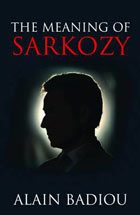Review: The meaning of Sarkozy | World news | The Observer
by Rafael Behr

by Rafael Behr

So what does Sarkozy stand for now? What, for that matter, does Gordon Brown stand for? Or David Cameron? Their strategies, their movements, their rhetoric, were all variations on a theme of liberal, free-market capitalism. Suddenly the music stopped and, like children in a party game, they were caught striking meaningless poses.
That is what western politics has always looked like to Alain Badiou. The eminent French philosopher is not tuned into the music of liberal democracy. He refuses to accept any of the premises of what he calls "parliamentary cretinism", preferring to judge politicians by their proximity to the absolute moral truth contained in "the communist hypothesis". On those terms, it isn't surprising that he finds the current French president deficient. In The Meaning of Sarkozy, the first English translation of Badiou's angry meditations after the election, the author can hardly bear to write his subject's name, referring to him mostly as "the Rat Man".
In Britain, this brand of ultra-leftism rarely leaves the university campus. But in some quartiers of Paris, Badiou is practically a celebrity. Salons erupted with feverish chatter when The Meaning of Sarkozy was first published. So when he quotes Mao approvingly and equivocates over the rights and wrongs of the Cultural Revolution, it is hard not to feel a certain pride in workaday Anglo-Saxon empiricism, which inoculates us against the tyranny of pure political abstraction. Badiou erects a huge theoretical edifice, heaping abstract nouns on top of each other, unhindered by any apparent obligation to cite data in support of his views. He thinks, therefore it is.
Yet the book is strangely compelling. Badiou is a serious philosopher, literary critic and dramatist. While the destination of his intellectual march is borderline Bolshevik, he makes some sensible observations about conservatism along the way. And since Britain's next prime minister is probably going to be a conservative, it is bracing to see that ideology assailed with such passion. After all, no one in the Labour party is doing the job.
So what is the meaning of Sarkozy? In Badiou's analysis, the conservative proposition in the election was basically fear. Sarkozy conjured a spectre of social breakdown and moral decline, playing on public concerns about crime and immigration. He had already cultivated a reputation as a hard man as interior minister under President Jacques Chirac and famously responded to race riots in Paris suburbs in 2005 with a promise to "hose the scum" off the streets.
That message was refined, in the presidential campaign, into a more nuanced promise of purgative change: a return to traditional social values and a "rupture" from social malaise, for which, Sarkozy implied, the left, with its fetish for all things anti-establishment, was to blame.
And how did the left respond? Demoralised and infiltrated by free market ideas, the Socialists, lead by Ségolène Royale, could only muster an appeal to fear of a different kind: that the right would tear away what few protections the state still offered against the ravages of a sink-or-swim capitalist economy. Badiou scorns this proposition as a vacuous derivation of Sarkozy's fear-mongering. He calls it fear of fear.
In such circumstances, the act of voting, he says, is senseless complicity in corruption. The lesser of two evils is still evil. He is particularly disgusted by the idea that popular consultation is supposed to bestow moral legitimacy on the winner. He deconstructs, with languid, sarcastic ferocity, the notion that "France chose Sarkozy". Which France? On whose terms did it choose?
Badiou's proposition is that rather than vote, the individual should reject all conventional political parameters and anchor himself to a transcendent truth proposition. By that, he means an idea - artistic, social, political - that does not depend on the surrounding commercial or cultural climate to give it meaning, and that expresses in some way the collective will of humanity to advance towards its ultimate emancipation. (If that sounds abstract, consider a fragment of the prose Badiou uses to develop the thesis: "In this way, we construct, in the temporality of opinion, a different duration, distinct from that which we have been driven into by the symbolisation of the state.") In other words, any belief that reinforces the capitalist status quo is morally suspect.
Badiou strives to distinguish his notion of communism from the one that rather conspicuously failed in the 20th century. But it is hard to escape the impression of an ageing class warrior - Badiou is 72 - railing against the waning of his own strength. He is the quintessential soixante-huitard - a veteran of the revolution manque in Paris in May 1968 - who, after climbing down from the barricade, forged a comfortable career teaching successive generations about the moral bankruptcy of the bourgeois state from inside bourgeois, state-funded universities.
No wonder he despises Sarkozy. The "bling bling" president with the pop star wife, who has actively positioned himself as a scourge of all that May 1968 represents in France, is Badiou's existential enemy. He sees Sarkozy as the embodiment of a strain of moral cowardice in French politics, in which the defining moment was the installation of Marshal Pétain as head of the pro-Nazi collaborationist government. For Badiou, Sarkozy is a symbol of "transcendent Pétainism".
This is a very French piece of political venom and many of Badiou's arguments don't apply in Britain. Still, there are motifs that resonate sharply on this side of the Channel. His account of the intellectual flaccidity of the French Socialist party - its fear-of-fear agenda - feels like a summary of Labour's next manifesto, while his attack on Sarkozy's promise of social renewal also applies to the "broken society" theme on which David Cameron campaigns.
Cameron has gone out of his way to avoid sounding authoritarian on social issues (remember the hug-a-hoodie phase?), but he shares with Sarkozy a kind of conservative moralism disguised as social radicalism. The underlying argument, familiar from any number of Daily Mail editorials, goes as follows: politically, the left is obsessed with state power; culturally, it indulges moral permissiveness. As state intervention increases, it creates welfare dependency, corroding individuals' self-reliance and allowing social bonds, such as the traditional family, to atrophy. Meanwhile, absolute moral authority is replaced by cultural relativism and, in the British version, "political correctness".
This argument, suggests Badiou, is a device to woo bourgeois voters, whose two greatest fears are crime and loss of wealth. It would not do for a politician to point out to those voters a connection between crime and inequality, since that would imply that they should surrender some of their wealth to the common good. Instead a new explanation for crime is devised - it is a moral failing among poor people. Better still, it is a moral failing engendered by the left! So not only has the left failed to emancipate the poor, it has actually corrupted them. The middle classes need no longer feel guilty at the sight of poverty. In fact, they can bask in the righteous glow of victimhood, believing themselves besieged by a degenerate, aggressive lower class.
In other words, the whole "broken society" line is an elaborate way of blaming poor people for their own problems and so, conveniently, justifying a refusal to change an iniquitous economic hierarchy. In the context of David Cameron's Tory party, it hardly makes sense to describe this as "transcendent Pétainism". So what, for the sake of argument, would our national equivalent be? Of what political thread might Cameron be the sublime manifestation?
It would be economically liberal - a variant of Thatcherism - but
dressed in vague aspirations to achieve social justice. It would eschew
any radical assault on the free market, diverting public anger instead
against the vice of "antisocial behaviour". And it would embody the
politics of winning and wielding power as a glorified public relations
exercise. The word for that, of course, is Blairism.

















هیچ نظری موجود نیست:
ارسال یک نظر